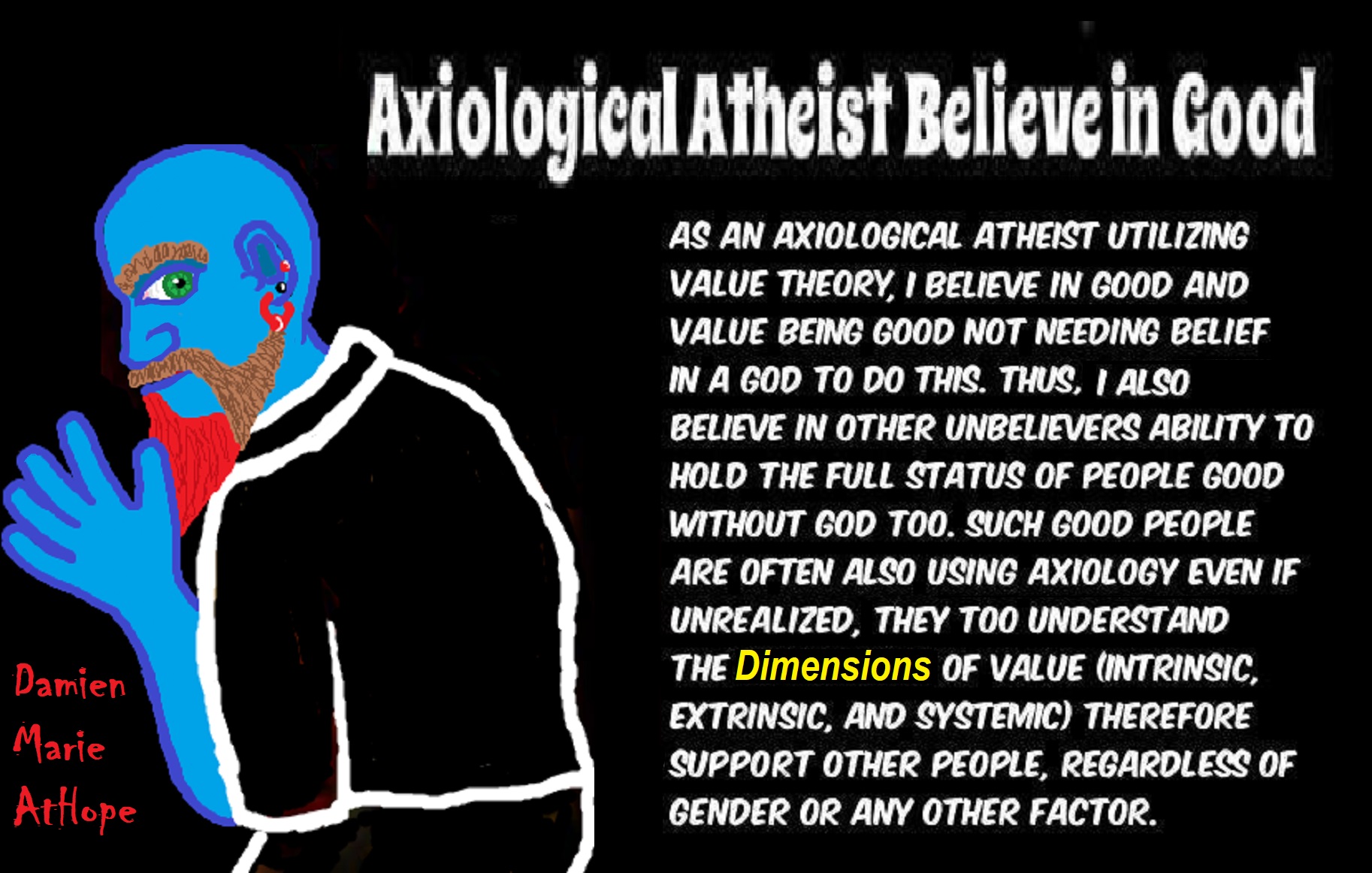
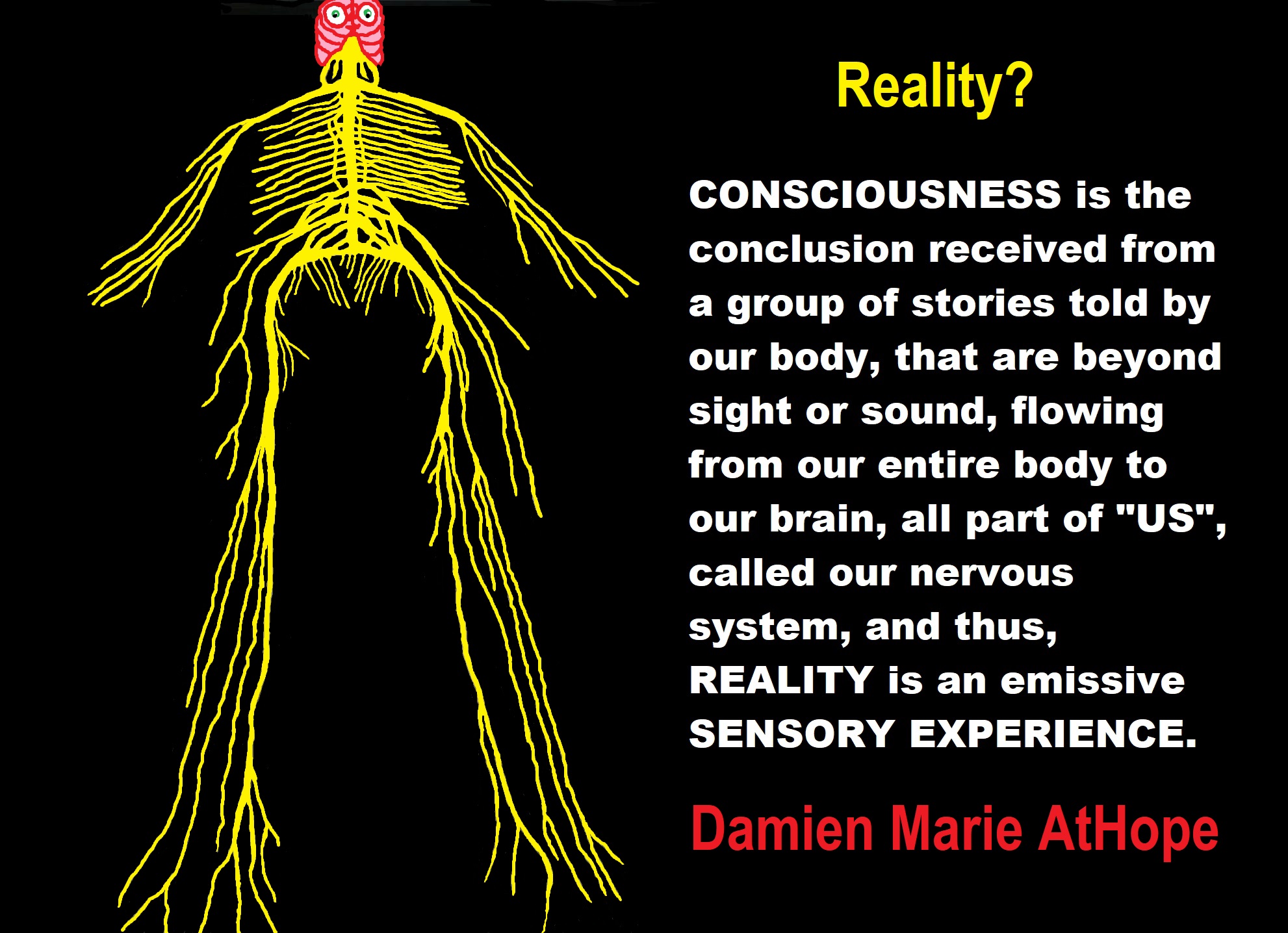
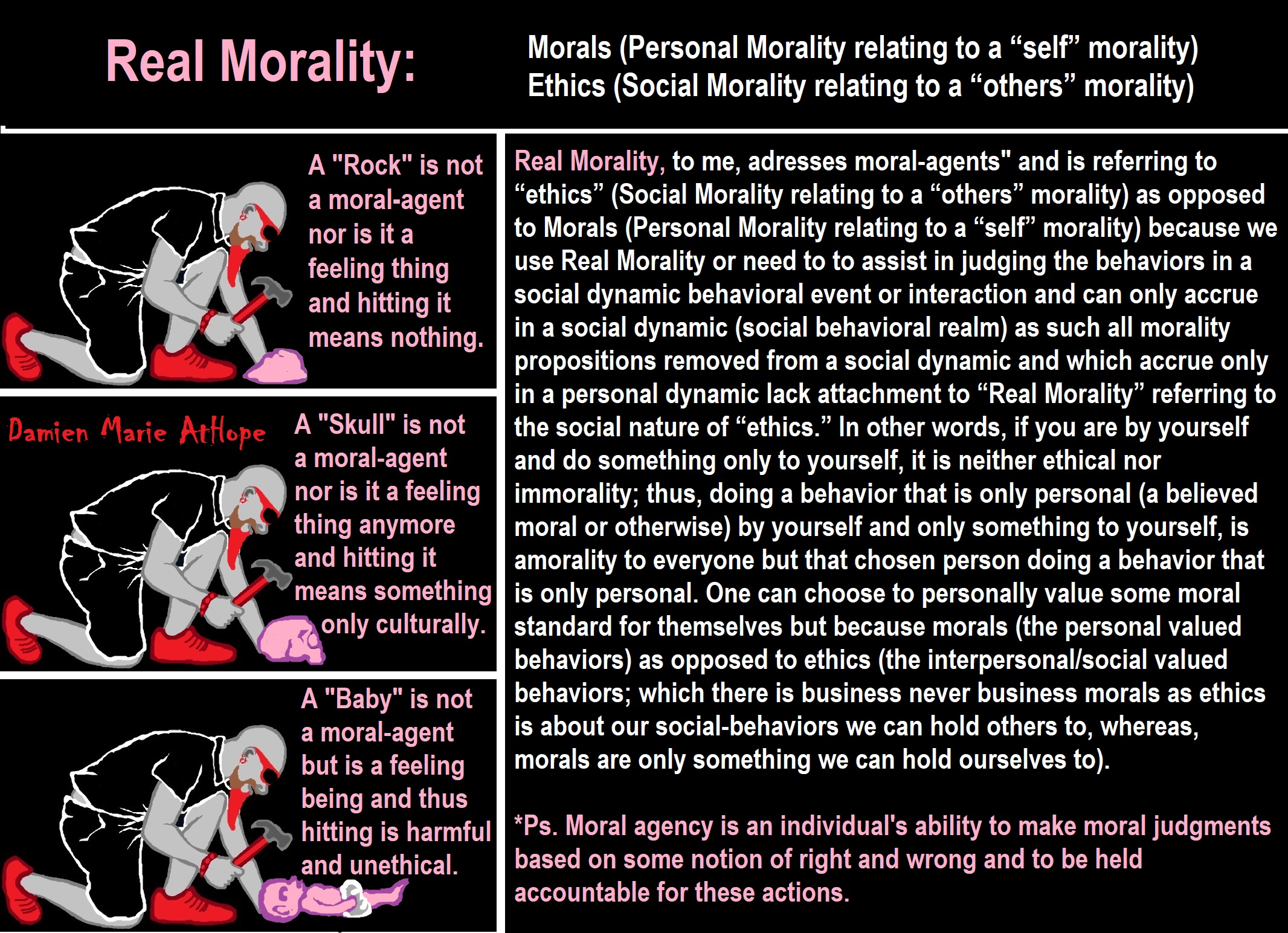
- Some significant questions in axiology include the following:
- Nature of value: is value a fulfillment of desire, a pleasure, a preference, a behavioral disposition, or simply a human interest of some kind?
- Criteria of value: de gustibus non (est) disputandum (i.e., (“there’s no accounting for tastes”) or do objective standards apply?
- Status of value: how are values related to (scientific) facts? What ultimate worth, if any, do human values have?
- Axiology is usually divided into two main parts.
- Ethics: the study of values in human behavior or the study of moral problems: e.g., (1) the rightness and wrongness of actions, (2) the kinds of things which are good or desirable, and (3) whether actions are blameworthy or praiseworthy.
- Consider this example analyzed by J. O. Urmson in his well-known essay, “Saints and Heroes”:”We may imagine a squad of soldiers to be practicing the throwing of live hand grenades; a grenade slips from the hand of one of them and rolls on the ground near the squad; one of them sacrifices his life by throwing himself on the grenade and protecting his comrades with his own body. It is quite unreasonable to suppose that such a man must be impelled by the sort of emotion that he might be impelled by if his best friend were in the squad.”
- Did the soldier who threw himself on the grenade do the right thing? If he did not cover the grenade, several soldiers might be injured or be killed. His action probably saved lives; certainly an action which saves lives is a morally correct action. One might even be inclined to conclude that saving lives is a duty. But if this were so, wouldn’t each of the soldiers have the moral obligation or duty to save his comrades? Would we thereby expect each of the soldiers to vie for the opportunity to cover the grenade?
- Æsthetics: the study of value in the arts or the inquiry into feelings, judgments, or standards of beauty and related concepts. Philosophy of art is concerned with judgments of sense, taste, and emotion.
- E.g., Is art an intellectual or representational activity? What would the realistic representations in pop art represent? Does art represent sensible objects or ideal objects?
- Is artistic value objective? Is it merely coincidental that many forms in architecture and painting seem to illustrate mathematical principles? Are there standards of taste?
- Is there a clear distinction between art and reality? Ref
- Ethics: the study of values in human behavior or the study of moral problems: e.g., (1) the rightness and wrongness of actions, (2) the kinds of things which are good or desirable, and (3) whether actions are blameworthy or praiseworthy.
What are values?
The question ‘what are values?’ is deceptively simple.
What are ‘values’ compared to concepts like ‘morals’, ‘ethics’, ‘principles’ or ‘beliefs’? These are abstract and philosophical concepts open to much debate. However, there are several generally acceptable definitions that have enough precision to provide schools with a common ground for exploring their approaches to values education. Values are the priorities individuals and society attach to certain beliefs, experiences, and objects in deciding how they shall live and what they shall treasure. (Hill, 2004) principles and fundamental convictions which act as general guides to behaviour, the standards by which particular actions are judged as good or desirable. (Halstead, Taylor and Taylor, 2000) Types of values Values as ‘principles and fundamental convictions’ are abstractions until they are applied in the contexts of daily life. Values are made real or ‘realised’ when their meaning is expressed through choices made and behaviours acted out. Emeritus Professor Brian Hill suggests that there are a number of values domains that derive from the contexts in which we live our lives and conduct our relationships. Most commonly, talk about values turns out to be talk about matters of morality. But the beliefs we live by, and the objects and activities we treasure, involve not only our moral approach to life but other interests and purposes which make for a rounded life, as illustrated in the diagram. For convenience, it is useful to speak of these various aspects as types or domains of value, ie areas of life in which we operate according to certain values that are appropriate to the activity in question. Our values are the selves we are becoming. There are many different ways of cutting the values cake, of course, so there is bound to be overlap in any categorisation. So talk about ‘domains of value’ is a convenience; not a fixed set of exclusive categories. Ref
These values domains are shown in the diagram:
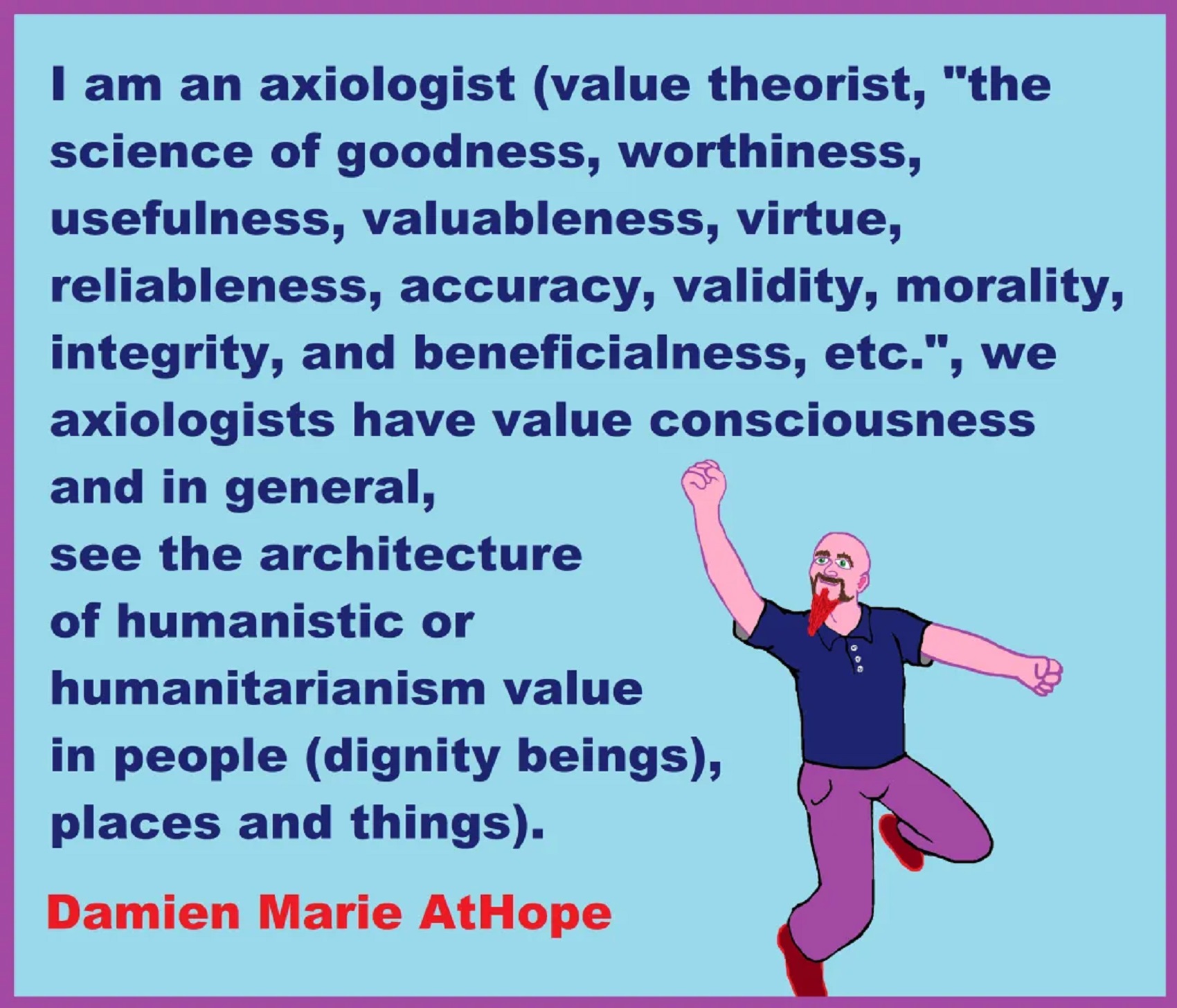
On the Value of Being a Real Person
Naturalistic Axiology?
Naturalistic Ethics: For the Naturalist, the baseline of value is that which is natural – that is, that which is in conformity with nature. One need not look beyond nature (The biopsychosocial model ) to some immaterial ideal for a standard of right and wrong. Rather, goodness will be found by living in harmony with nature. Evil, for the Naturalist, is a departure from this natural norm either in the direction of excess or defect (i.e., having, or doing, too much or too little of something which is naturally good). Naturalistic Aesthetics: In seeking good appearance, or sound, the Naturalist will look to nature as the standard. Thus, for the Naturalist, art should imitate nature. If a Naturalist is painting a portrait of a person who has a facial scar, the Naturalist will paint the scar because reality includes imperfection. Ref
Pragmatic Axiology?
Pragmatic Ethics: Much that was said in the discussion above about pragmatic epistemology could also be said here about pragmatic ethics. The Pragmatist believes that value claims must be tested and proven in practice. In the Pragmatist’s view, things are value-neutral in themselves. There is nothing that is always good, nor is there anything that is always bad. The value of anything is determined solely in terms of its usefulness in achieving some end. In answer to the question, “Is that good?”, a Pragmatist would probably reply, “Good for what?” Thus, the Pragmatist believes that the end justifies the means. That is, if something is useful for achieving some end or goal, then it becomes good. To state this another way, a means gets its positive value from being an efficient route to the achievement of an end. Thus, a means is not valued for its own sake, but only in relation to its usefulness for achieving some end. Results or consequences are the ultimate measure of goodness for a Pragmatist, since the usefulness of a means to an end can only be judged after the fact by its effect on the end. Thus, for the Pragmatist, there can be no assurance that something is good…until it is tried. Even then, it is only held tentatively as good since a thing is good only as long as it continues to work. Evil, for the Pragmatist, is that which is counterproductive. It is (usually) a breaking of civil or criminal law. There can be a dispute about which means are more effective for achieving an end. Indeed, there can be a dispute about which ends should, in fact, be pursued. Thus, the Pragmatist looks for guidance from the group. The reasons for this are metaphysical: reality is experience, but it is the experience of the whole. For the Pragmatist, the whole is greater than the sum of its parts. This means that the whole is more valuable than any of its parts. In the field of value judgments, the group’s wisdom is more highly esteemed than the wisdom of any individual within the group. Pragmatic Aesthetics: In keeping with the Pragmatist value theory, there is no appearance or sound which is, in itself, good or bad. Appearances or sounds take their value from their relationships to group goals. Thus, in the realm of art, values will be determined by the majority view and in relation to the social benefit of the art in question. Ref
Existentialistic Axiology?
Existentialistic Ethics: As with knowledge, the individual must create his/her own value. There is no escape from the necessity of creating values. Just as the world is defined by the choices regarding knowledge that an individual makes, so the individual must express her/his own preferences. In making choices, or defining values, the individual becomes responsible for those choices. The individual cannot deflect praise or blame for those choices onto others. If the choices were freely made, then responsibility for them must be accepted. While heredity, environment, and society might influence what choices an individual makes, there is a zone of freedom within each individual that cannot be conditioned or predetermined. An Existentialist is not necessarily a non-conformist, but if an Existentialist conforms to the values of a group it will be because that person has freely chosen to do so – not because they have been pressured to do so by the group. Evil, for the Existentialist, is being false to self. It is a breaking of one’s personal law. Existentialistic Aesthetics: The question of what is good in appearance or sound will be determined, in Existentialist terms, solely by each individual. Value, like reality and truth, must be created by the person. It is not *found* preexisting, or determined by group concensus. Thus, how value is portrayed will be a matter of individual preference. What is good art for you may be bad art for me, and vice versa. Ref
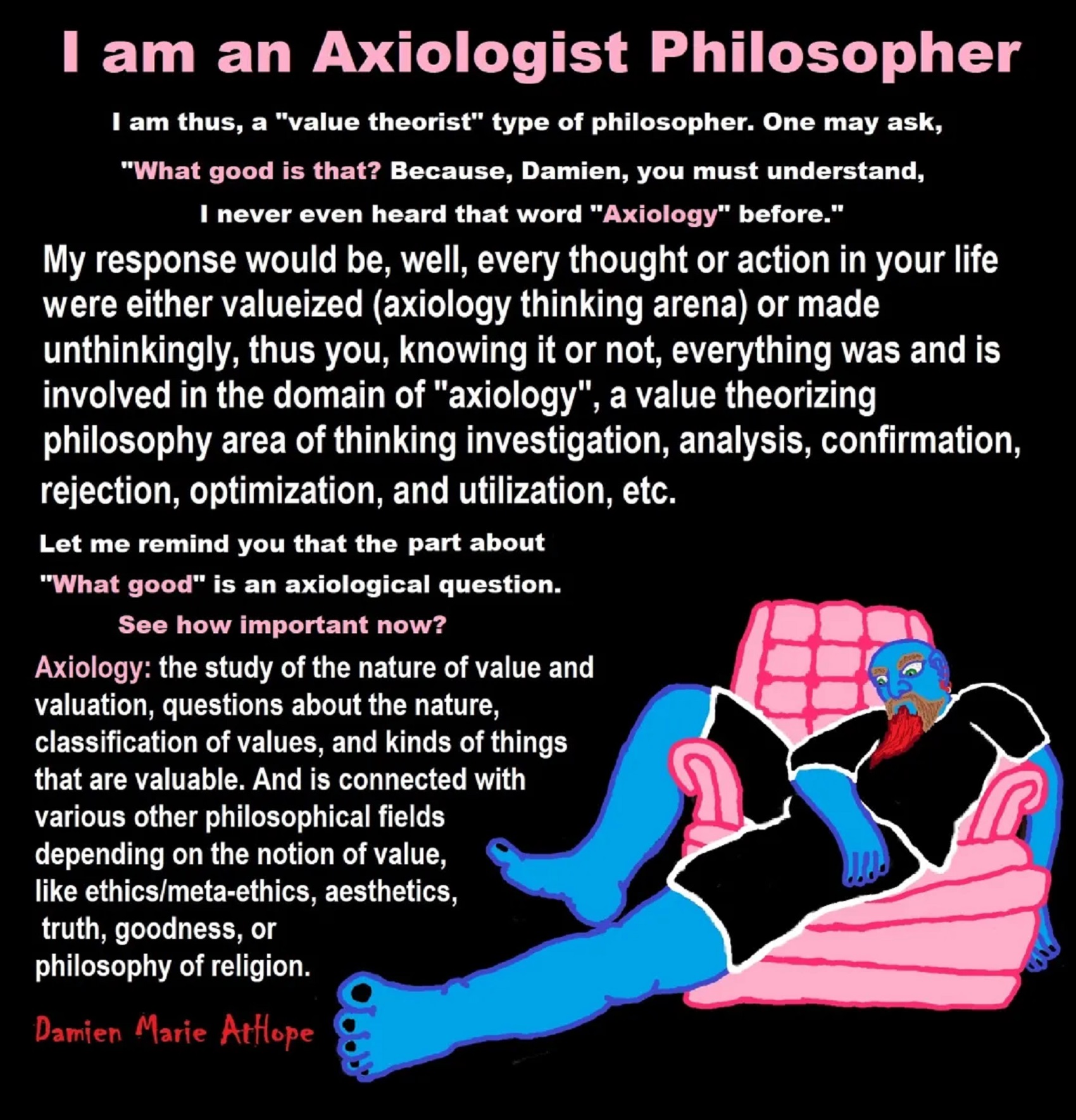
Axiology “Goodness-for” questions/assertion: Judge assesses and value judges because of qualities in or lacking in the claim.
*Axiology (understanding what is good or valuable as well as what is evil or unvaluable like how the stories about theist theistic gods are often racist, sexist, homophobic, transphobic intersexphobic, xenophobic, etc. Thus, they are directly against humanity and thus are evil and unvaluable. Unvaluable; as in the god concept you have is evil and demonstrably harmful and thus is highly unvaluable to humanity)
-Why are your objects of proposed value subjective psychological states or objective physiological external world states for your claim?
-Why do your purposed descriptive words fit qualities for valuation (such as “powerful”, “knowing”, and “present” in the Omnipotent: all-powerful, Omniscient: all-knowing, and Omnipresent: all-present god assertion) your claim?
-Why is your value-for, worth-for, and/or goodness-for claims different than other similar claims?
“what value do you think what you are saying has and to what level of proof do you feel truth needs as well as how do you insure Accuracy” (asking to find the truth or as usual expose the lack of a good Axiology)
Let me explain why as an axiological atheist (value theory atheist) even the belief in the concept of god is ethically vile to me. God belief is inherently immoral to me it is the belief that supports an all powerful being who willfully allows suffering, something that no ethical person would tolerate if they had the ability to do otherwise. Moreover, a common attribute of god belief is support of this claimed greater being of high intelligence and self will forcing its will and standards on other beings of high intelligence and self will. This force is unethical and abusive to the rights of humanity. Furthermore, many who subscribe to this force abusive relationship god claim an even more revolting ethical atrocity called hell where eternal horror and suffering is dished out by direct will of the claimed stronger immoral god being against the defenseless undeserving subjugated humanity. Thus, being one, who values rights and ethics, it sickens me to even speak of such willful misconduct of justice. Your god concept is vile… (axiology value judgment).
Origin of Logics is Naturalistic Observation
Scientific Values: fallibilism, realism, & rationalism
Explaining Axiological theism, Axiological agnosticism, and Axiological atheism
I Am a Rationalist and Support Reasonable Skepticism
Philosophical Skepticism, Solipsism and the Denial of Reality or Certainty
You can’t change people, by reason and evidence. WRONG, I do it all the time.
Ontology, Epistemology, & Axiology argument/challenge protocol
“The Hammer if Truth” (scientific philosophy: Ontology, Epistemology, & Axiology) in action.
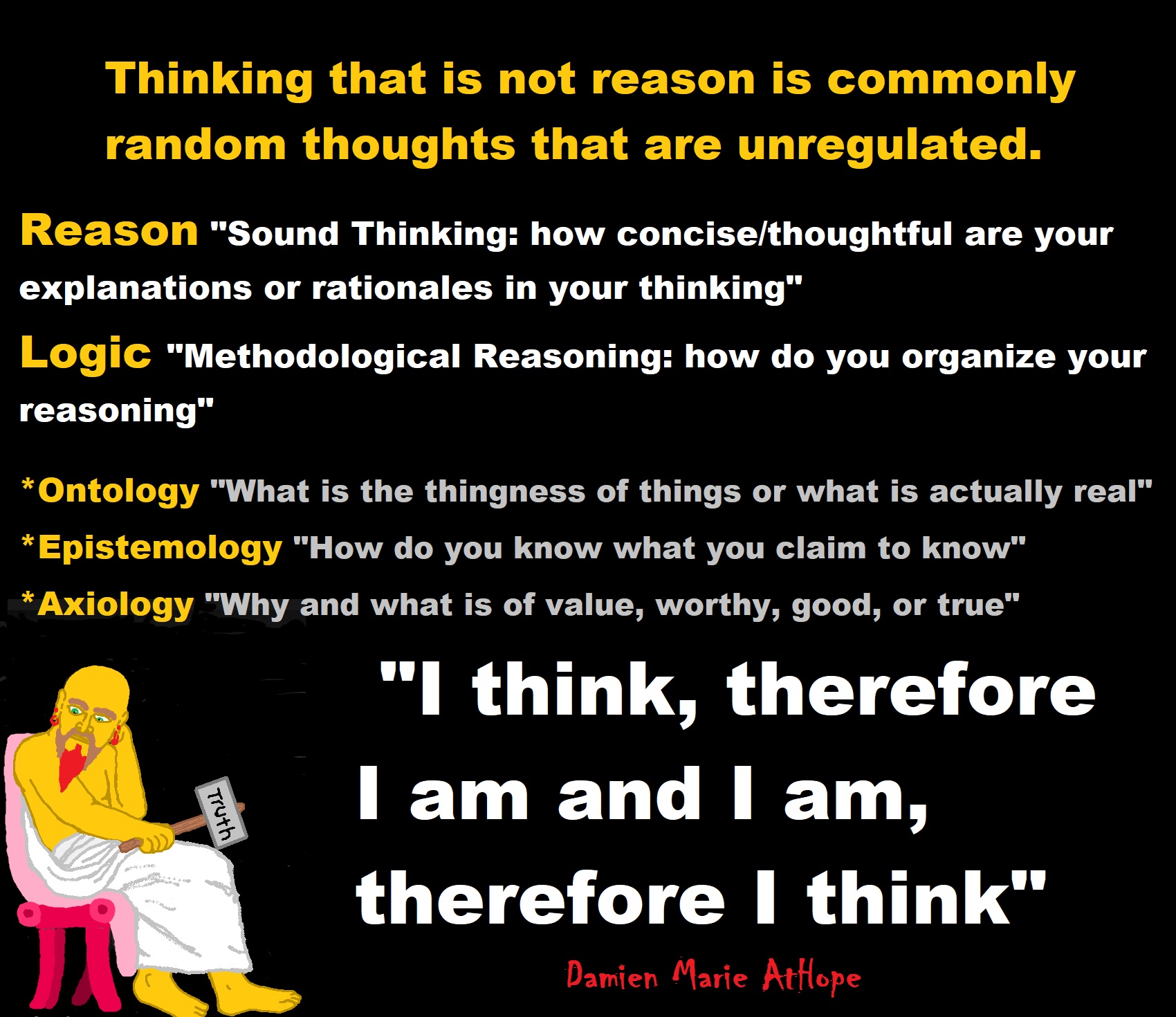
Humans are Prone to Thinking Errors, and Yes This Includes Theism.
Coherent Definition of god?
I am an Ignostic atheist and not only do not believe in the term gods I reject that even the term or concept of god has any real thing or true reality connected definition. To me there is no one coherent definition of god even if they think articulation proves real meaning, this proves little more that me saying someone believes in a “Triangle-Square-Circle”. To the term god I thus regards it as empty of real meaning and or real definition constancy, so I see it as something that is not really know or knowable or coherently define able as a real object even if it can add arbitrary words to articulate it is still not something outside man-made arbitration.
One may say no the god definition is real one cannot say it is not, as most people generally known what the term god means thus that cannot be rejected. Really?? I could be misunderstanding this reasoning put against Ignostic Atheist thinking but to me it seems to hold the opinion, saying I must accept the god concept as something definable in reality because ad populum? In argumentation theory, an argumentum ad populum (Latin for “appeal to the people”) is a fallacious argument that concludes that a proposition is true because many or most people believe it: “If many believe so, it is so.”
Bigfoot’s, Unicorns, and Gods the rational conclusion using Axiology
So how do we form rational conclusions? More importantly how do we differentiate between the levels involved to establish a conclusions rational viability. It takes axiology or the value judgment the worthiness or lack thereof in relation to the available reason and evidence.
So let’s start with the axiological viability of Bigfoots
There is no available evidence for Bigfoots.
But is their proposition outside of reason?
Always start in reality from the evidence we do know, such as a primate/nonhuman hominid close to that of both humans and other nonhuman primates is not entirely outside all possibility of reason even though lacking all evidence. Therefore, belief is not warrant and the axiological worthiness of possibility is low enough to motivate disbelief.
Next The axiological viability of Unicorns (ie. a horse with a single horn on its head)
There is no evidence for Unicorns.
But is their proposition outside of reason?
As always start in reality from the evidence we do know, such as by looking at the evolution of the horse not once was there a horn on any of the several stages of animals to the horse we know today. So it is relatively outside of possibility though as it is still only claiming non fantastic attributes it is only somewhat ridiculous. Therefore, belief is not in any way warranted and the axiological worthiness is so low to highly support disbelief.
Now the axiological validity of Gods
There is no evidence for God(s).
But is their proposition God(s) outside of reason?
As always start in reality from the evidence we do know, such as never in the history of scientific research or investigation has any supernatural claims shown to be true. So it is completely outside of possibility and is utterly ridiculous. Therefore, belief should be rejected as there are no warrants at all and it is axiologically unworthy to such a preponderance to demand disbelief.
The following are some evidence against a caring god working in the world. A recent study of the current living conditions throughout Africa shows that more than one billion people do not have enough clean water to provide for their basic human needs. As a result, more than 2,500 children are dying each day. I guess it is that god gives us free will by keeping children from clean water in an unproportioned amount to the civilized science filled world. I ask you, does your god not hear their prayers? According to Missionaries of Africa (2008), there is a water crisis and diseases that are living in dirty water are wiping out entire villages and communities. Does god exist? Does the magic chanting of prayer seem to work? Suppose for a minute with the understanding of religious believe, if there was a loving god and it answered even some prayers, would not the most deserving be the non-sinning? Moreover, what living human could be said to be less sinning than a baby and thus the most deserving. In addition, babies or children are likely the ones religionists/fideists pray most often, for when they are in trouble. Belief changes nothing. Whatever circumstances you are in or not, has nothing to do with belief. If you are poor, belief does not make you not poor. If you are rich, you do not stay rich because of belief. You would think that poor people would have the benefit of the heavenly means and have god on their side, if anyone would, right? Overall, in 186 countries, first-day child death rates for babies are 6.9%. Where was god? In Angola, 8% of the babies die and 95% of the population is christian. In Congo, 7.5% of the babies die and 95.8 % of the population is christian. Whereas in Guinea-Bissau, 9% of the babies die and 10 % of the population is christian and in Niger 8.7% of the babies die and 5% of the population is christian. Therefore, being a christian and begging for an all-powerful all loving god myth to do something that any half-decent human being would hardly even need to be asked to help an innocent child, shows that belief seems to make no difference in the world because the world is godless and sadly babies die. Isaiah 45:7 “I form the light, and create darkness: I make peace, and create evil: I god do all these things.” Ref
Just think, the bible god “could” have banned slavery or shellfish and he chose to ban shellfish (Leviticus 11:12) and actually support slavery (Leviticus 25:44-46) even in the new testament (Ephesians 6:5; 1 Timothy 6:1-2) and Jesus clearly approves of beating slaves even if they didn’t know they were doing anything wrong (Luke 12:47-48) how crazy and immoral is that for a man-made fairy tales. I will openly say faith is foolish lacking credibility and it is stupid to hold on to beliefs that are disproved by science fact. However, I don’t usually call people names even ones saying things I believe are ridiculous nor do I belittle them instead I strive to and support attacking the thinking and not the person.
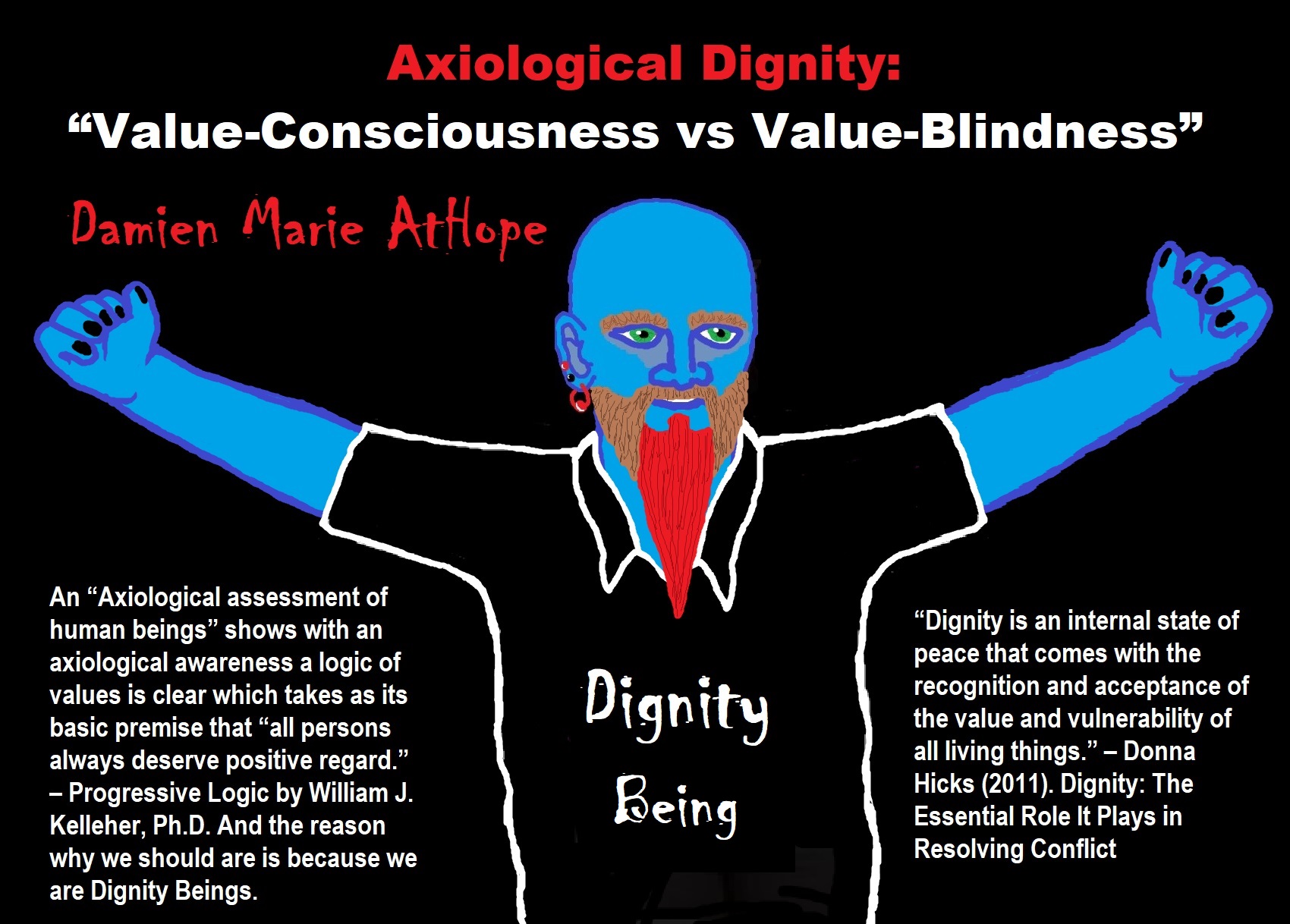
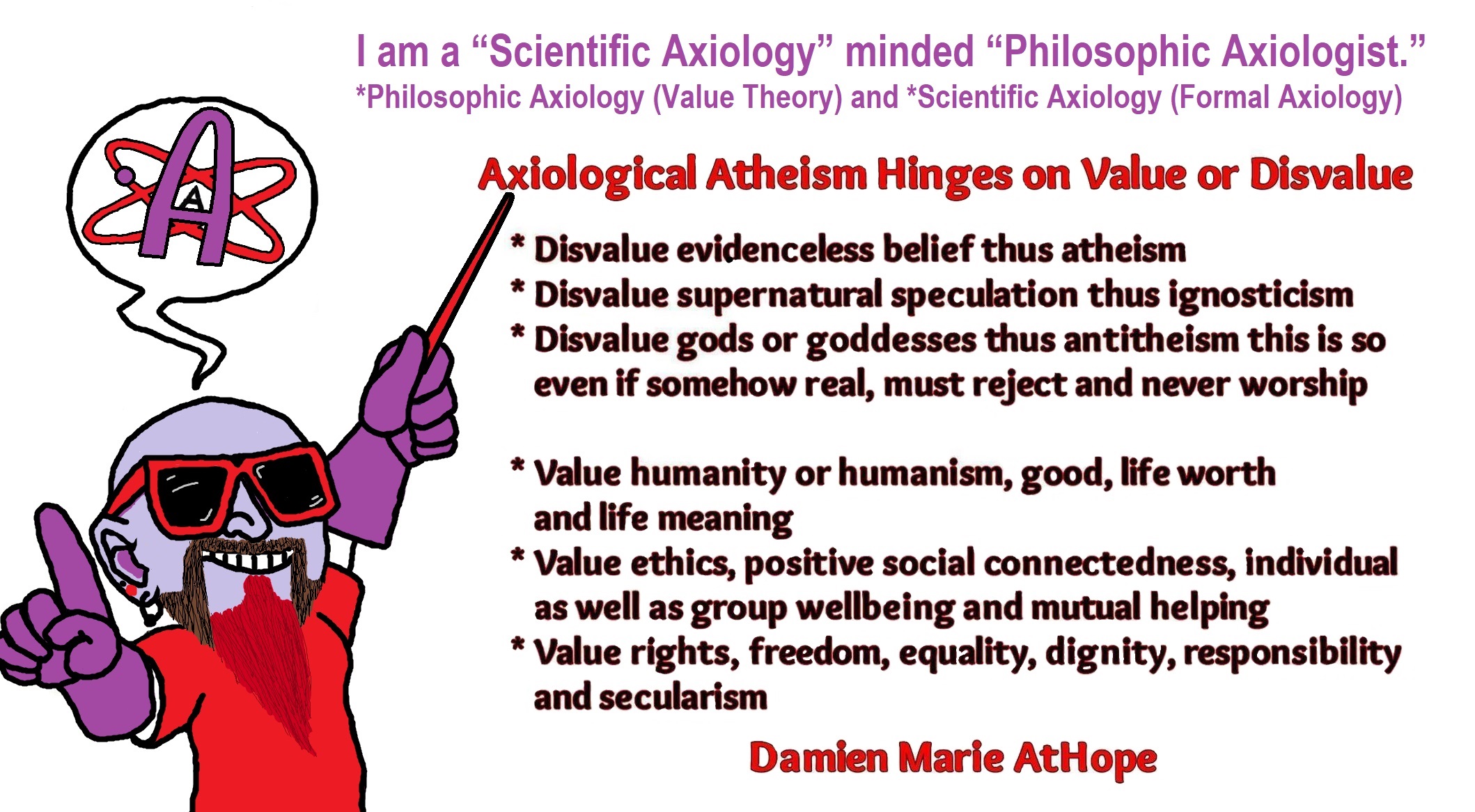
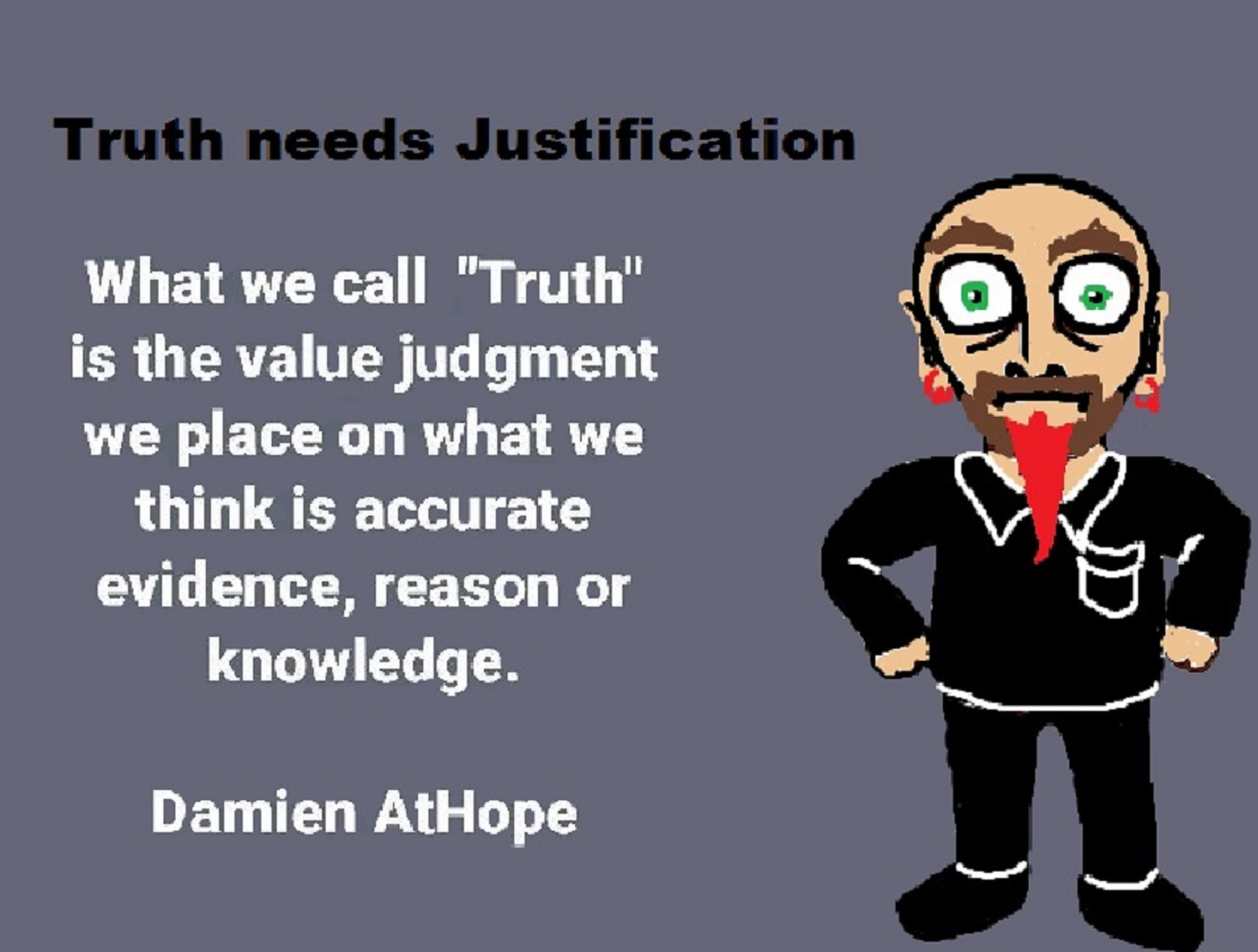
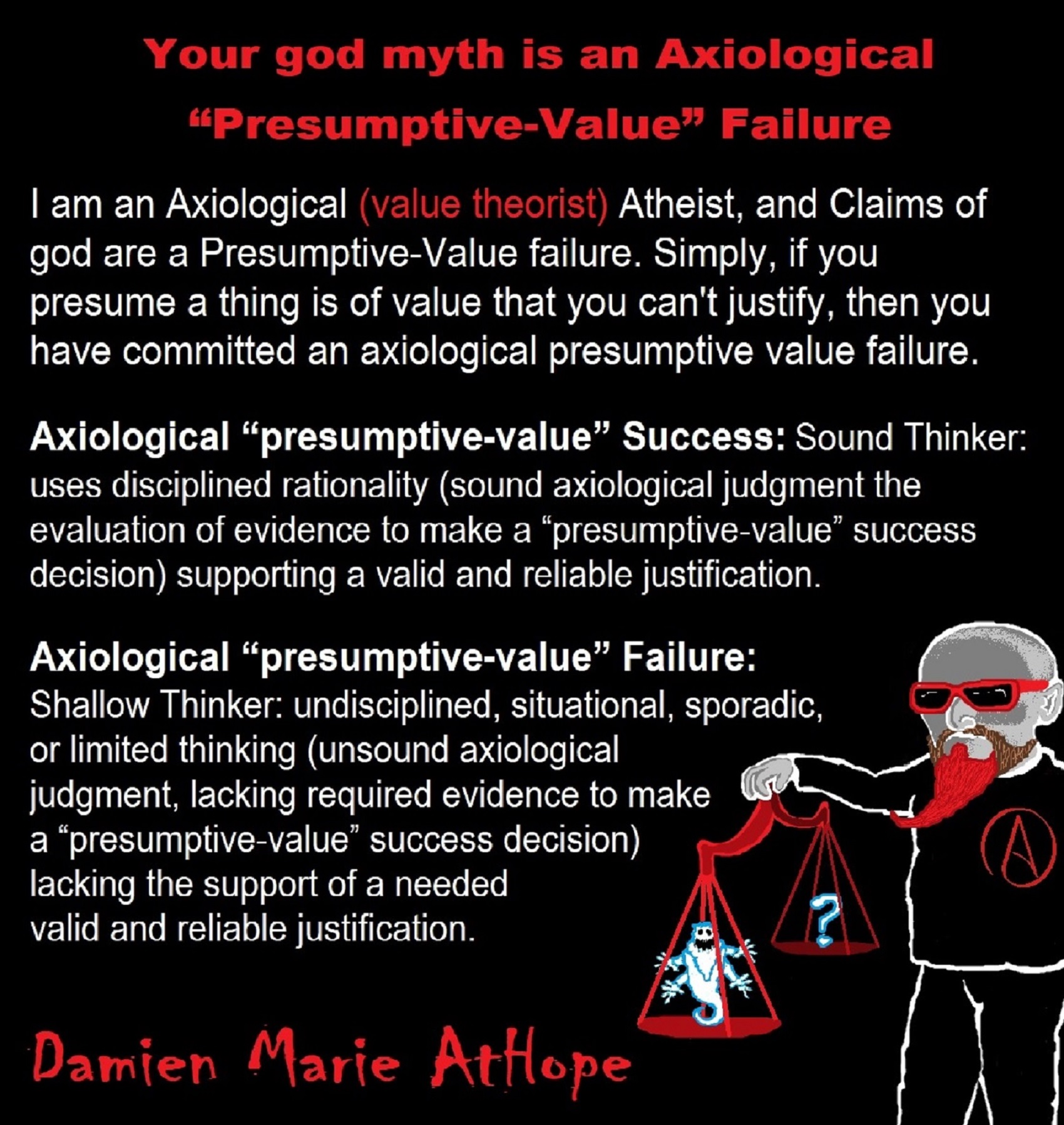
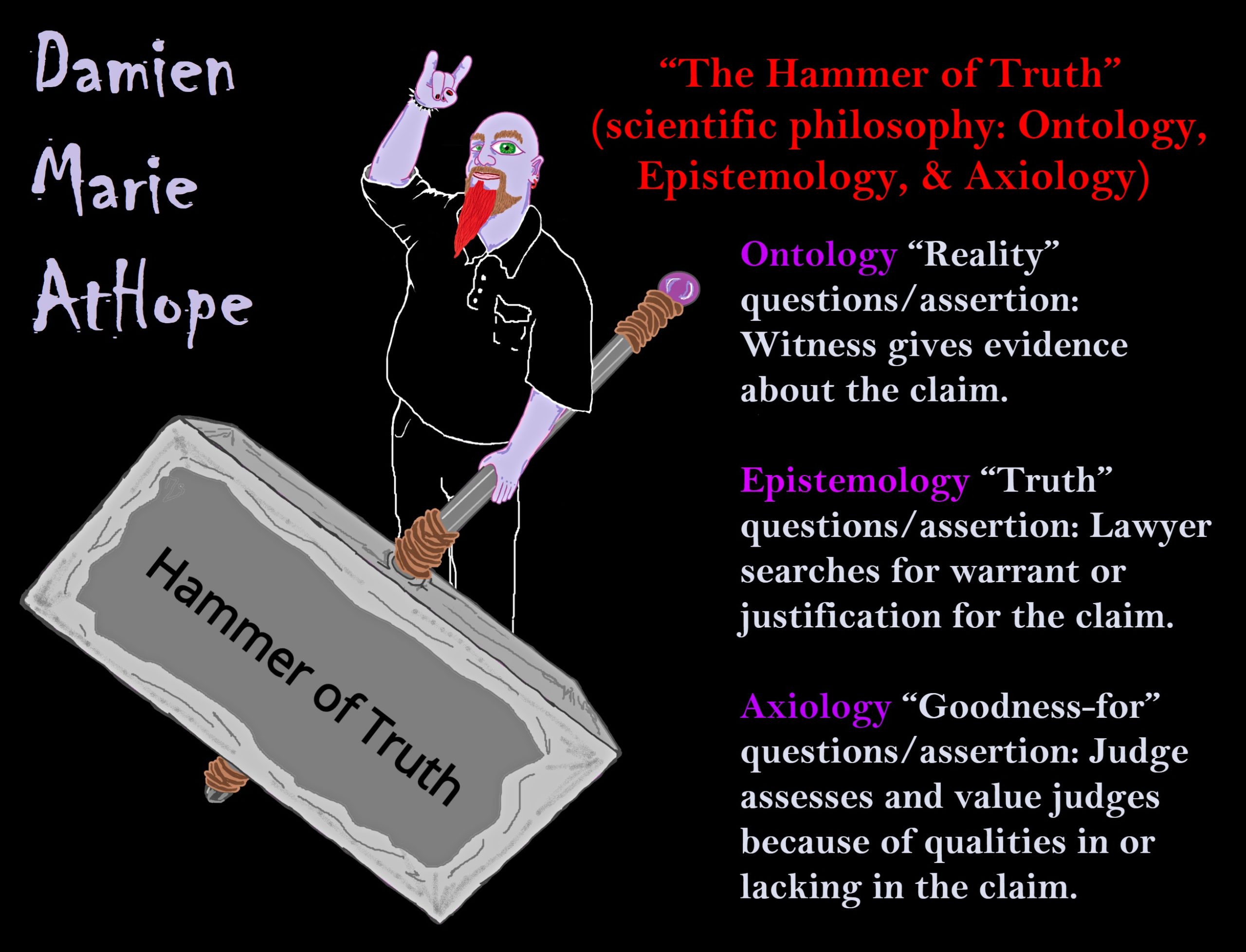
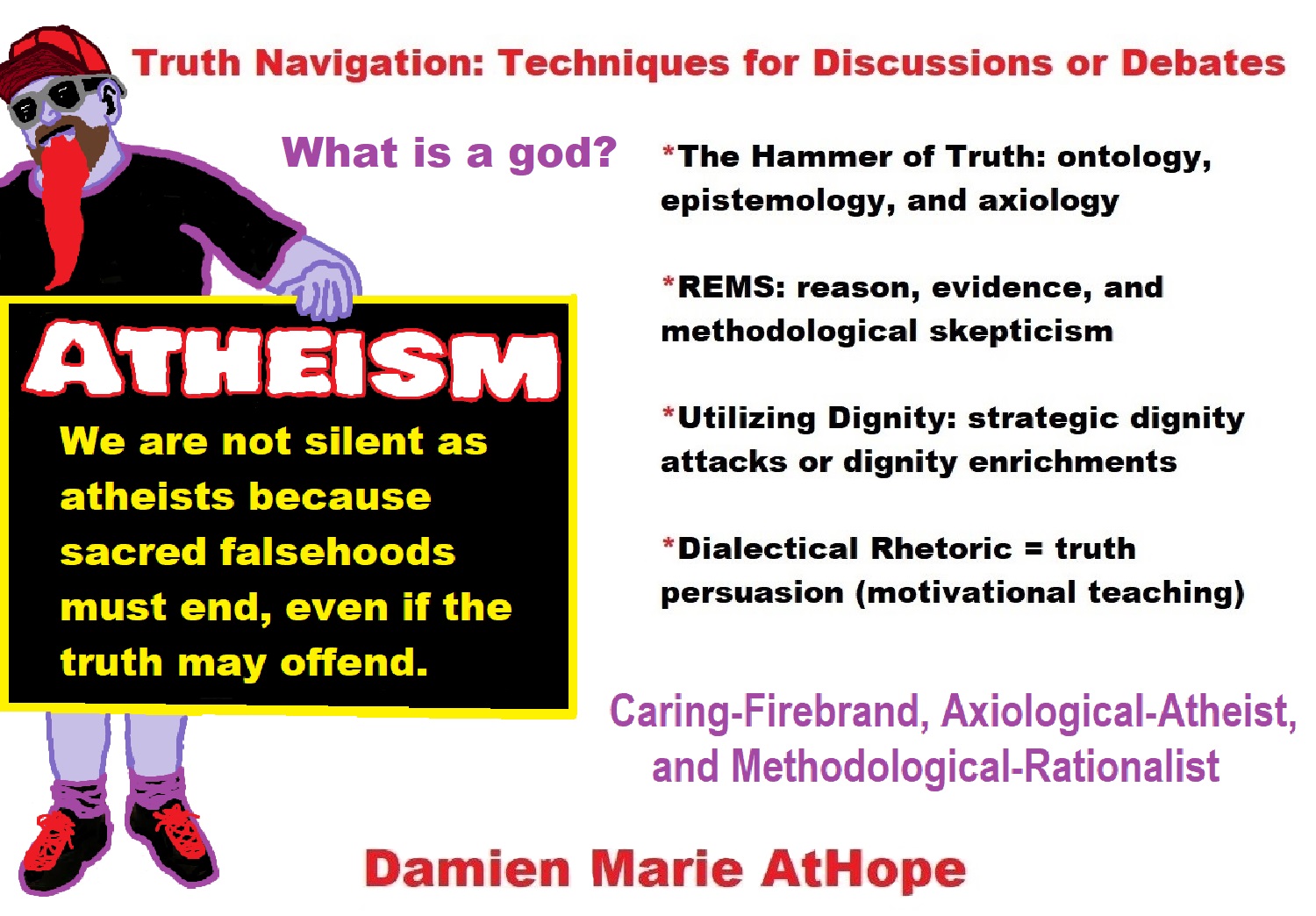
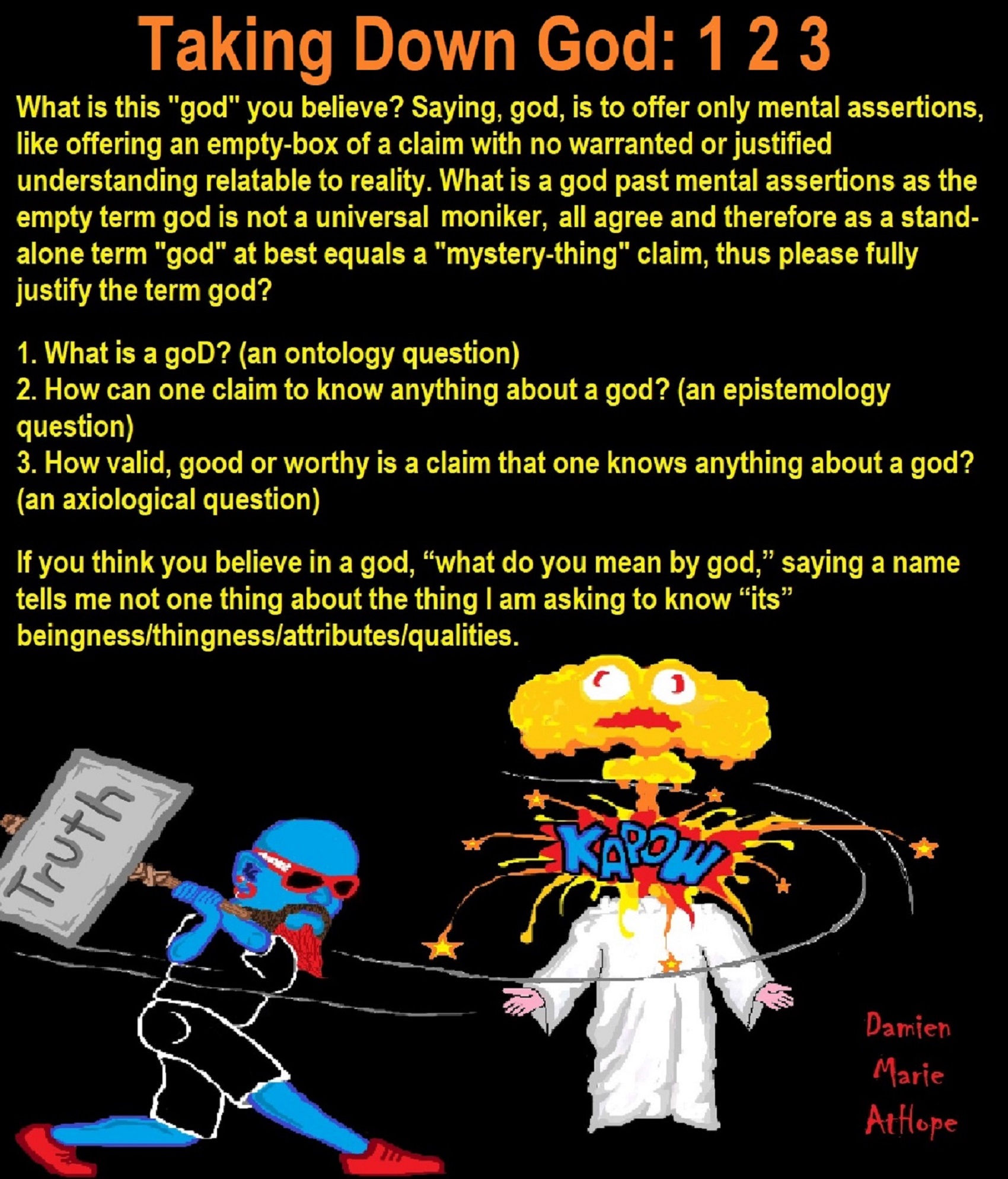


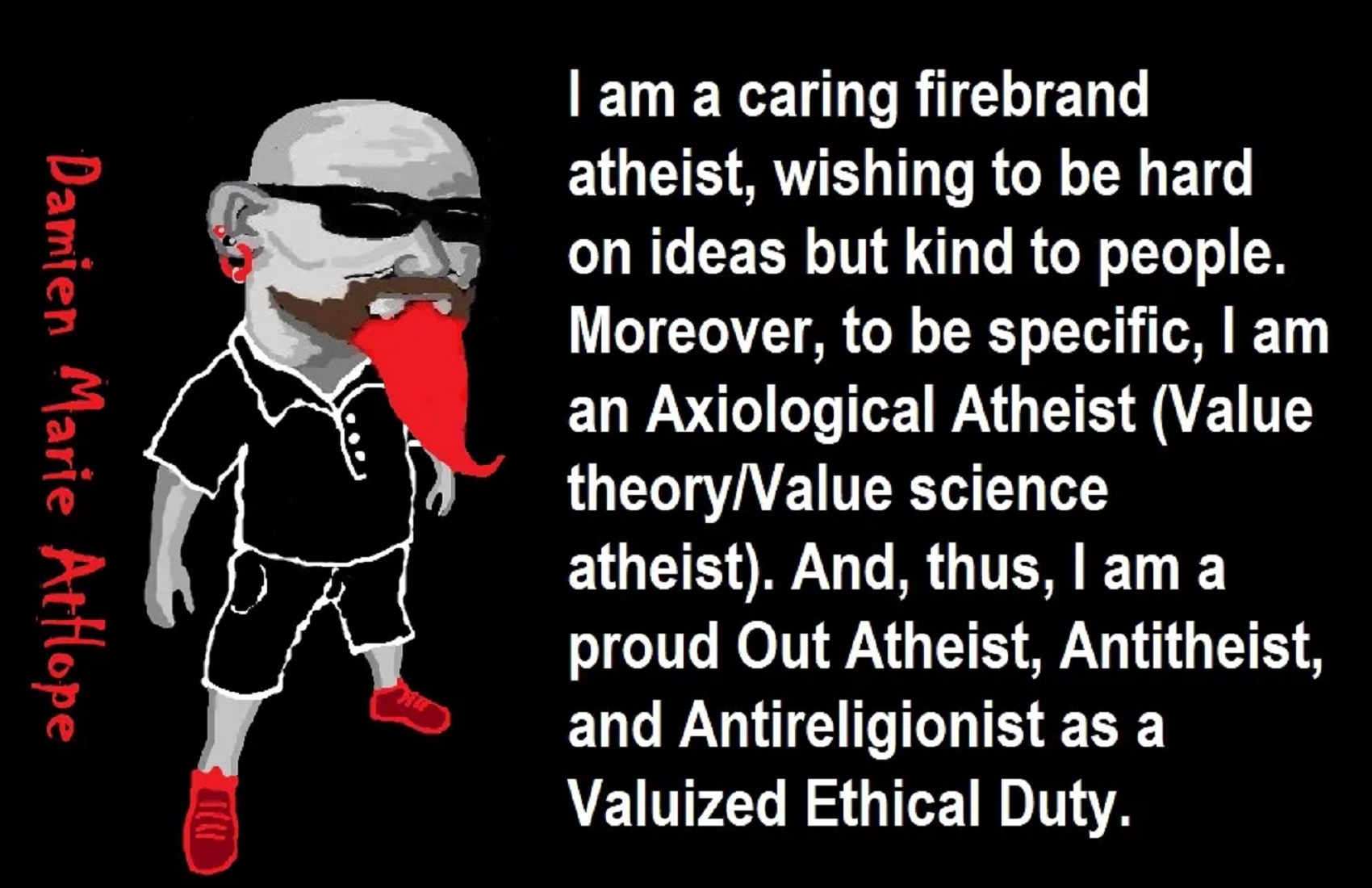
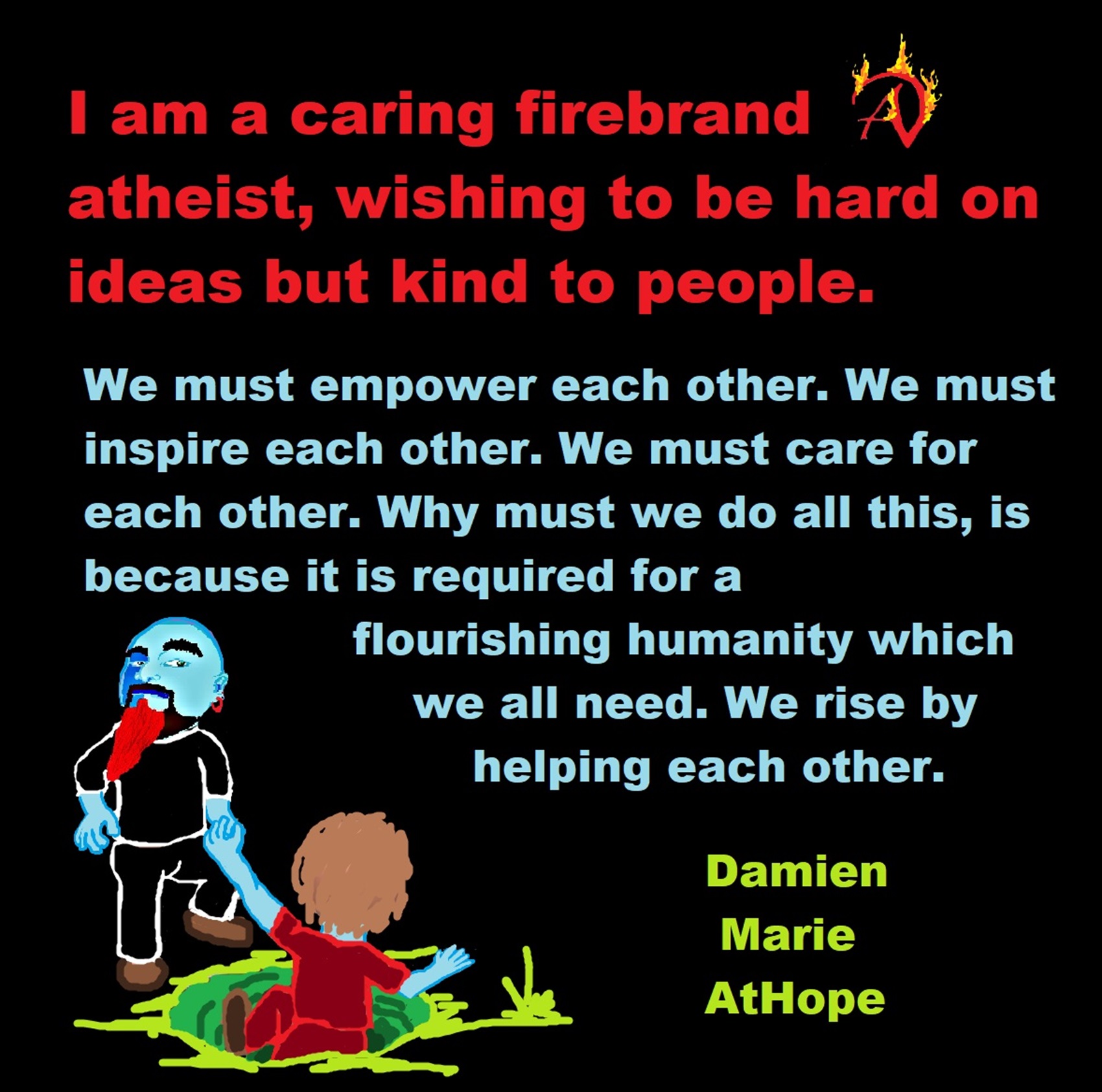
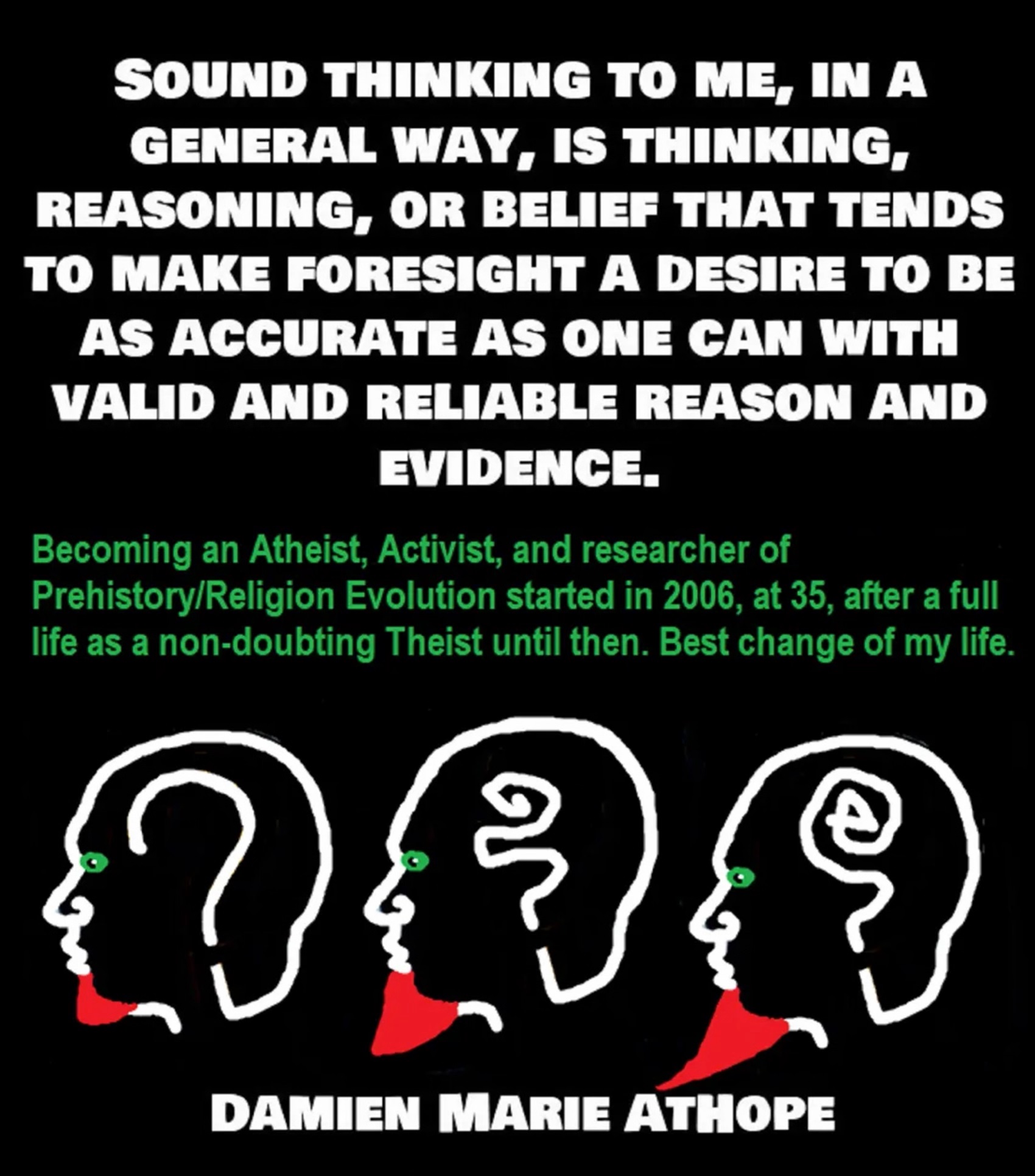

“Theists, there has to be a god, as something can not come from nothing.”
Well, thus something (unknown) happened and then there was something. This does not tell us what the something that may have been involved with something coming from nothing. A supposed first cause, thus something (unknown) happened and then there was something is not an open invitation to claim it as known, neither is it justified to call or label such an unknown as anything, especially an unsubstantiated magical thinking belief born of mythology and religious storytelling.


While hallucinogens are associated with shamanism, it is alcohol that is associated with paganism.
The Atheist-Humanist-Leftist Revolutionaries Shows in the prehistory series:
Show two: Pre-animism 300,000 years old and animism 100,000 years old: related to “Anarchism and Socialism”
Show tree: Totemism 50,000 years old: related to “Anarchism and Socialism”
Show four: Shamanism 30,000 years old: related to “Anarchism and Socialism”
Show five: Paganism 12,000 years old: related to “Anarchism and Socialism”
Show six: Emergence of hierarchy, sexism, slavery, and the new male god dominance: Paganism 7,000-5,000 years old: related to “Anarchism and Socialism” (Capitalism) (World War 0) Elite and their slaves!
Prehistory: related to “Anarchism and Socialism” the division of labor, power, rights, and recourses: VIDEO
Pre-animism 300,000 years old and animism 100,000 years old: related to “Anarchism and Socialism”: VIDEO
Totemism 50,000 years old: related to “Anarchism and Socialism”: VIDEO
Shamanism 30,000 years old: related to “Anarchism and Socialism”: VIDEO
Paganism 12,000 years old: related to “Anarchism and Socialism” (Pre-Capitalism): VIDEO
Paganism 7,000-5,000 years old: related to “Anarchism and Socialism” (Capitalism) (World War 0) Elite and their slaves: VIEDO
Paganism 5,000 years old: progressed organized religion and the state: related to “Anarchism and Socialism” (Kings and the Rise of the State): VIEDO
Paganism 4,000 years old: related to “Anarchism and Socialism” (First Moralistic gods, then the Origin time of Monotheism): VIEDO
I do not hate simply because I challenge and expose myths or lies any more than others being thought of as loving simply because of the protection and hiding from challenge their favored myths or lies.
The truth is best championed in the sunlight of challenge.
An archaeologist once said to me “Damien religion and culture are very different”
My response, So are you saying that was always that way, such as would you say Native Americans’ cultures are separate from their religions? And do you think it always was the way you believe?
I had said that religion was a cultural product. That is still how I see it and there are other archaeologists that think close to me as well. Gods too are the myths of cultures that did not understand science or the world around them, seeing magic/supernatural everywhere.
I personally think there is a goddess and not enough evidence to support a male god at Çatalhöyük but if there was both a male and female god and goddess then I know the kind of gods they were like Proto-Indo-European mythology.
This series idea was addressed in, Anarchist Teaching as Free Public Education or Free Education in the Public: VIDEO
Our 12 video series: Organized Oppression: Mesopotamian State Force and the Politics of power (9,000-4,000 years ago), is adapted from: The Complete and Concise History of the Sumerians and Early Bronze Age Mesopotamia (7000-2000 BC): https://www.youtube.com/watch?v=szFjxmY7jQA by “History with Cy“
Show #1: Mesopotamian State Force and the Politics of Power (Samarra, Halaf, Ubaid)
Show #2: Mesopotamian State Force and the Politics of Power
Show #3: Mesopotamian State Force and the Politics of Power (Uruk and the First Cities)
Show #4: Mesopotamian State Force and the Politics of Power (First Kings)
Show #5: Mesopotamian State Force and the Politics of Power (Early Dynastic Period)
Show #6: Mesopotamian State Force and the Politics of Power
Show #7: Mesopotamian State Force and the Politics of Power (Sargon and Akkadian Rule)
Show #9: Mesopotamian State Force and the Politics of Power (Gudea of Lagash and Utu-hegal)
Show #12: Mesopotamian State Force and the Politics of Power (Aftermath and Legacy of Sumer)

The “Atheist-Humanist-Leftist Revolutionaries”
Cory Johnston ☭ Ⓐ Atheist Leftist @Skepticallefty & I (Damien Marie AtHope) @AthopeMarie (my YouTube & related blog) are working jointly in atheist, antitheist, antireligionist, antifascist, anarchist, socialist, and humanist endeavors in our videos together, generally, every other Saturday.
Why Does Power Bring Responsibility?
Think, how often is it the powerless that start wars, oppress others, or commit genocide? So, I guess the question is to us all, to ask, how can power not carry responsibility in a humanity concept? I know I see the deep ethical responsibility that if there is power their must be a humanistic responsibility of ethical and empathic stewardship of that power. Will I be brave enough to be kind? Will I possess enough courage to be compassionate? Will my valor reach its height of empathy? I as everyone, earns our justified respect by our actions, that are good, ethical, just, protecting, and kind. Do I have enough self-respect to put my love for humanity’s flushing, over being brought down by some of its bad actors? May we all be the ones doing good actions in the world, to help human flourishing.
I create the world I want to live in, striving for flourishing. Which is not a place but a positive potential involvement and promotion; a life of humanist goal precision. To master oneself, also means mastering positive prosocial behaviors needed for human flourishing. I may have lost a god myth as an atheist, but I am happy to tell you, my friend, it is exactly because of that, leaving the mental terrorizer, god belief, that I truly regained my connected ethical as well as kind humanity.
Cory and I will talk about prehistory and theism, addressing the relevance to atheism, anarchism, and socialism.
At the same time as the rise of the male god, 7,000 years ago, there was also the very time there was the rise of violence, war, and clans to kingdoms, then empires, then states. It is all connected back to 7,000 years ago, and it moved across the world.
Cory Johnston: https://damienmarieathope.com/2021/04/cory-johnston-mind-of-a-skeptical-leftist/?v=32aec8db952d
The Mind of a Skeptical Leftist (YouTube)
Cory Johnston: Mind of a Skeptical Leftist @Skepticallefty
The Mind of a Skeptical Leftist By Cory Johnston: “Promoting critical thinking, social justice, and left-wing politics by covering current events and talking to a variety of people. Cory Johnston has been thoughtfully talking to people and attempting to promote critical thinking, social justice, and left-wing politics.” http://anchor.fm/skepticalleft
Cory needs our support. We rise by helping each other.
Cory Johnston ☭ Ⓐ @Skepticallefty Evidence-based atheist leftist (he/him) Producer, host, and co-host of 4 podcasts @skeptarchy @skpoliticspod and @AthopeMarie
Damien Marie AtHope (“At Hope”) Axiological Atheist, Anti-theist, Anti-religionist, Secular Humanist. Rationalist, Writer, Artist, Poet, Philosopher, Advocate, Activist, Psychology, and Armchair Archaeology/Anthropology/Historian.
Damien is interested in: Freedom, Liberty, Justice, Equality, Ethics, Humanism, Science, Atheism, Antiteism, Antireligionism, Ignosticism, Left-Libertarianism, Anarchism, Socialism, Mutualism, Axiology, Metaphysics, LGBTQI, Philosophy, Advocacy, Activism, Mental Health, Psychology, Archaeology, Social Work, Sexual Rights, Marriage Rights, Woman’s Rights, Gender Rights, Child Rights, Secular Rights, Race Equality, Ageism/Disability Equality, Etc. And a far-leftist, “Anarcho-Humanist.”
I am not a good fit in the atheist movement that is mostly pro-capitalist, I am anti-capitalist. Mostly pro-skeptic, I am a rationalist not valuing skepticism. Mostly pro-agnostic, I am anti-agnostic. Mostly limited to anti-Abrahamic religions, I am an anti-religionist.
To me, the “male god” seems to have either emerged or become prominent around 7,000 years ago, whereas the now favored monotheism “male god” is more like 4,000 years ago or so. To me, the “female goddess” seems to have either emerged or become prominent around 11,000-10,000 years ago or so, losing the majority of its once prominence around 2,000 years ago due largely to the now favored monotheism “male god” that grow in prominence after 4,000 years ago or so.
My Thought on the Evolution of Gods?
Animal protector deities from old totems/spirit animal beliefs come first to me, 13,000/12,000 years ago, then women as deities 11,000/10,000 years ago, then male gods around 7,000/8,000 years ago. Moralistic gods around 5,000/4,000 years ago, and monotheistic gods around 4,000/3,000 years ago.
To me, animal gods were likely first related to totemism animals around 13,000 to 12,000 years ago or older. Female as goddesses was next to me, 11,000 to 10,000 years ago or so with the emergence of agriculture. Then male gods come about 8,000 to 7,000 years ago with clan wars. Many monotheism-themed religions started in henotheism, emerging out of polytheism/paganism.


Damien Marie AtHope (Said as “At” “Hope”)/(Autodidact Polymath but not good at math):
Axiological Atheist, Anti-theist, Anti-religionist, Secular Humanist, Rationalist, Writer, Artist, Jeweler, Poet, “autodidact” Philosopher, schooled in Psychology, and “autodidact” Armchair Archaeology/Anthropology/Pre-Historian (Knowledgeable in the range of: 1 million to 5,000/4,000 years ago). I am an anarchist socialist politically. Reasons for or Types of Atheism
My Website, My Blog, & Short-writing or Quotes, My YouTube, Twitter: @AthopeMarie, and My Email: damien.marie.athope@gmail.com
